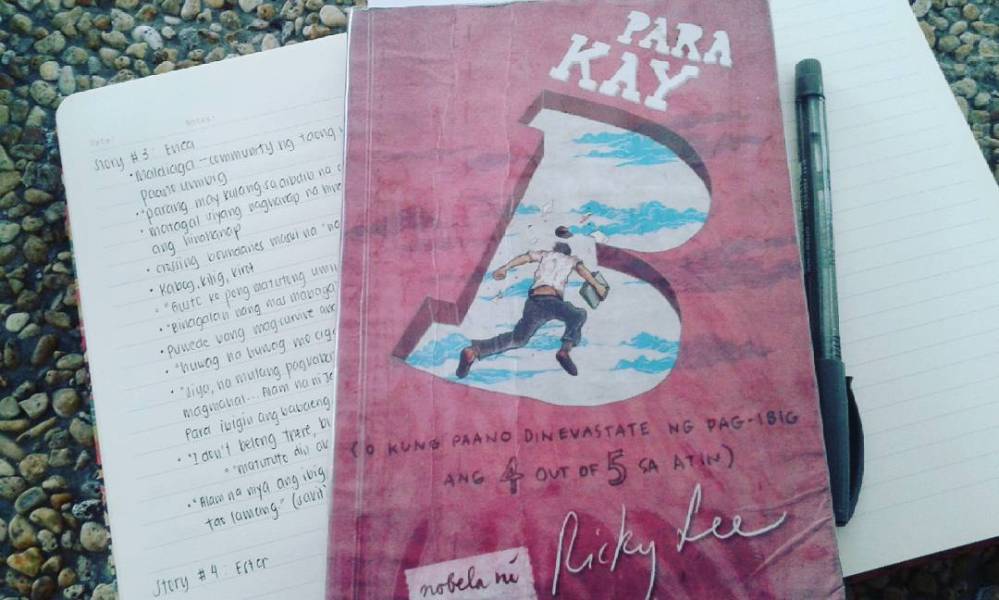
Last December 5, my friend Joseph and I watched the play adaptation of Ricky Lee’s 2008 novel Para Kay B in the University of Santo Tomas. I first read the book last year, but was not able to finish it after the 2nd story since I got caught up with school. To be honest, I don’t think I’d have continued back then because the 2nd story was a little too much for me (it was about incest, for the curious). But some books you end up loving after the next try.
I ended up loving the play, but it left me wanting more. To its credit, UST’s Teatro Tomasino did a good job in fitting the entire book into a two-hour production that still came out logical and understandable. It was entertaining, and the addition of the Writer’s narration injected into each scene helped in guiding the audience follow the narrative throughout the show. However, it did suffer with the time constraint, and so I found myself a little bit dissatisfied with the build-up towards the ending. And so I finally continued reading the book the minute I got home.
I do plan to read the book. I was trying to start from the 3rd story since that’s where I left off before, and I wanted to have finished it in time for our play schedule. But then it is finals week, and I am caught up yet again with a number of school works. I am apparently lucky that the play happened after finals week, thus I ended up reading the book from the start—all over again from the first story. It was such a great read and experience that I can’t help rambling about it online.
What I’m going to do here is a close reading and review of each of the stories in the book. Ricky Lee effectively synthesized all 5 stories at the end of the book, and it left me having a broader perspective in the romance department. I’ve been going through my life constantly telling myself not to have a romantic idea of love because I happen to have people who often shoots down my ideals into this thing they call “reality.” I often have someone tell me, “hindi naman ganyan sa totoong buhay,” But then after reading this book, I realized that it’s not all about what someone claims as real and true, since more often than not they are laced with cynicism and a bitter memory of bad break-ups. The romantic kind of love happens in real life, and not everyone was privileged to have that kind of love last. And yet, this is not a reason for every romantic experience to be considered as a mere euphoria of the moment.
The real question here is, might I propose, how do you know when the romantic experience you’re having is love? Masasabing pag-ibig na nga ba kung umabot na sa puntong iginugupo ka na nito? Ricky Lee, through the Writer in the story, proposed a theory: may quota daw ang pag-ibig. Sa bawat limang umiibig, isa lang daw ang nagiging masaya. 1 out of 5, that’s how slim the chances are, and you’re not even sure if you can make it to the cut.
IRENE, ang unang kwento
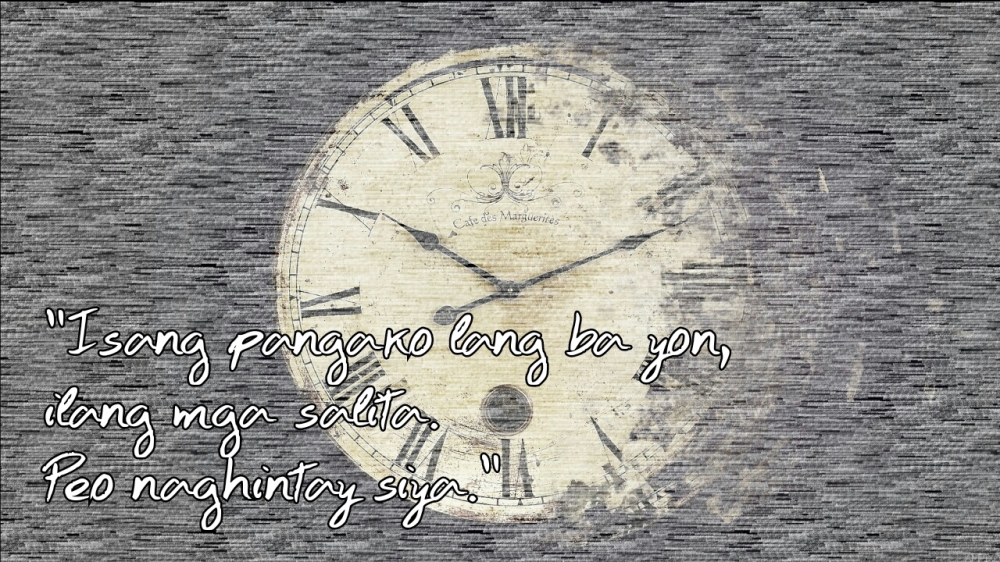
There’s nothing more binding in life than the word ‘promise.’ Apparently, it was also the most vicious. The first section in Para Kay B tells the story of Irene: a girl who has a power memory that can make her remember just about anything in a matter of seconds. She has a special way of compartmentalizing them in her brains so that when come times that she needs it, Irene can pull it out any minute. However, a memory of a guy comes back to her every now and then–one that she can’t control no matter what.
It was the memory of Jordan, a guy she met back in her hometown San Ildefonso when she was 11. He was 16, a survivor of an assault against his parents who were killed because they were believed to be rebel sympathizers. Jordan didn’t have a good life despite having been adopted by a priest into his church. He was constantly the subject of contempt by the teens his age, and one incident of fighting with the Mayor’s son put him in the hot seat with the Mayor’s wife.
Irene was his only solace. This girl who followed him like a shadow, and the lent ears that would eagerly listen to his anger and frustration about life. At the young age of 11, she fell in love with him–a time when she, according to her mother, doesn’t even know what love is. Umiibig ka kasi nang ‘di mo pa nalalaman kung ano ang ibig sabihin ng pag-ibig. One afternoon, in the midst of a rally near the town bridge, Jordan picked up a cheap watch. When he and Irene met, he gave her the watch along with the promise, “Paglaki mo, pakakasalan kita. Pangako.” The next day, Jordan was forced to leave their town. Little did they know that this promise will forever bind Irene to her past, never quite moving forward, never quite planning to go on with her life.
And all the while she waited for him, going out with other guys she only keeps around for sex–that damned cheap watch always wrapped around her wrist, but it could very well be around her heart. So it made me wonder, in the same way that her friends always chastised her, why is she spending her life waiting for a guy instead of seeking him out? Her defense was fate–that if it’s meant to be, they will find each other again–but somehow, I do agree that it’s also pride. Irene was, while hopeful, bound with a dilemma that the promise might not be real. For all she knows, Jordan might only be playing with her when he gave her that watch. Yet, she waited.
Was it really love or was she just hung up on the memories? Was she afraid to look for him because she does not want to burst that bubble of her idea of him? At that point in her life, it seems that it’s more about pride. She waited for him for about 14 years after all, and she was scared that if she did look for him, he might not remember her at all. The promise that she held on to might turn out to be a passing whim on his end, never to be realized. When they did meet, the thing she feared most came to be true. Jordan cannot remember her, at best not anything that reminds him of his ill-fated life back in San Ildefonso. Irene was so heartbroken that she took revenge on him by a one-night-stand, and leaving him the next morning without so much a trace.
Minahal niya ba talaga ang lalaking ito o umibig lang siya sa alaala? It was a question that will forever haunt her. Irene was in her critical period when that promise was made to her. A time where all that happens to her sticks for a long time. It’s pretty understandable for Irene to take Jordan as an a-hole when he can’t even place her in his memories, but I do think that there’s still so much to be uncovered had she stayed and confronted him with it. If she did love him (with complete disregard of that promise), the best way could have been hanging on to hear his backstory and make him remember. But she left all heartbroken because that sweet memory was shattered, and their story left me dismayed. Irene was so persistent to get close to Jordan before, and even if he left her to remember all those memories they had before, it’s a shame that she couldn’t be persistent now to make it work. I was left high and dry, but their story is fixable. With a little twist, they can be the couple of the 1 out of 5 who gets their happiness.
SANDRA, ang pangalawang kwento

Fairness: what a term. This second story from the book was the most provocative out of the five, but totally off in that it felt honestly uncomfortable on my part while I was reading it. It was the story of Sandra, and her love affair with her brother Lupe. It’s an incest relationship where they felt a kind of spark the moment their hands brushed against each other. They consummate their love in a warehouse all the while leading their parents to a knowledge that they’re just in there to sort things out in helping the family business. It sounds wrong, because it was really wrong. It was a taboo that is fairly unacceptable–I mean marrying a cousin was acceptable back in the old days, but having an affair with your sibling is just an entirely different story. However, I have to take a step back in discussing this part of the story and suspend my personal disbelief. On an ordinary day, I will never consider it, but there’s a point somewhere in the narrative that is worthy of discussion: and that is the idea that a love that is correct does not feel a lot like love because you’re not really happy about what you have.
After their parents caught them, Lupe was thrown out of their house. He was trying to get Sandra to come with him, but she chose to stay. That day, she was consumed by the realization that what they were doing was not right after all, and decided that she owes it to her parents to do well in school as a payback to the sin that she and her brother committed. Sandra grew up alright, and she ended up having a long-term relationship with Ruben. Her relationship with him, she describes, is like a well-measured recipe: Isang pag-ibig na pinag-aralan. It was resonant in her tone of voice that she sees him as a reliable boyfriend, the right guy to be with, but she was not in love with him. All these years, her heart still beats for Lupe, and of course, the reason why she couldn’t look for her was the fact that they’re siblings. It was not right no matter how much we turn the world upside down.
Still, Sandra chose to leave Ruben when she met Lupe again by accident, trying to hold them up and steal their phones. They would meet up in a motel room, and Lupe will stay up watching Sandra sleep. All the while, his eyes dart towards the door, scared that someone will barge in to take Sandra away, just like what their parents did before. It’s clear now that there’s something wrong with Lupe, and along that affair, he realized that he can be the cause of Sandra’s unhappiness because of his criminal records. He decided to leave her and disappear from her life. And yet, she left him pregnant with their child.
In the end, Sandra married Ruben. He accepted her along with her child Belinda, who was a special child. He loves her so much and so unconditionally, and even accepted Belinda as his own. What could Sandra be asking for more? To her, it was fair and right to have married Ruben and built a family with him. But somehow, she was not happy, because her heart was locked and sealed with that one person he just can never have. Hers and Ruben’s was a love she claims to be acceptable, because it was correct. And so, it makes me wonder whether love depends on happiness? May mas matimbang bang pag-ibig? To be fair, I feel that Sandra loves Ruben, but it is clear that it’s out of gratitude. In her heart, she holds a place for Lupe. In her every conviction of herself that what she has with Ruben is right, there comes a certain tinge of devaluation of that love every time she describes it as ‘pero tama.’
Her story left me thinking whether the idea of love surpasses morals and norms? All along, we are told that there is nothing right or wrong when we fall in love with someone. The things we do, we do out of love. Love was the prime mover that makes us do great things. But Sandra’s story suggests just the opposite of that: there is a right or wrong in love in that you can probably have these feelings for someone, but a certain limit holds you from acting on it. Instead of their supposed love moving things to greatness, it ruined their family to a great deal. It left them both contented and happy with what they have now, depende daw sa kung anong definition mo ng pagiging masaya, but somewhere underneath we all know they’re not.
ERICA, ang pangatlong kwento
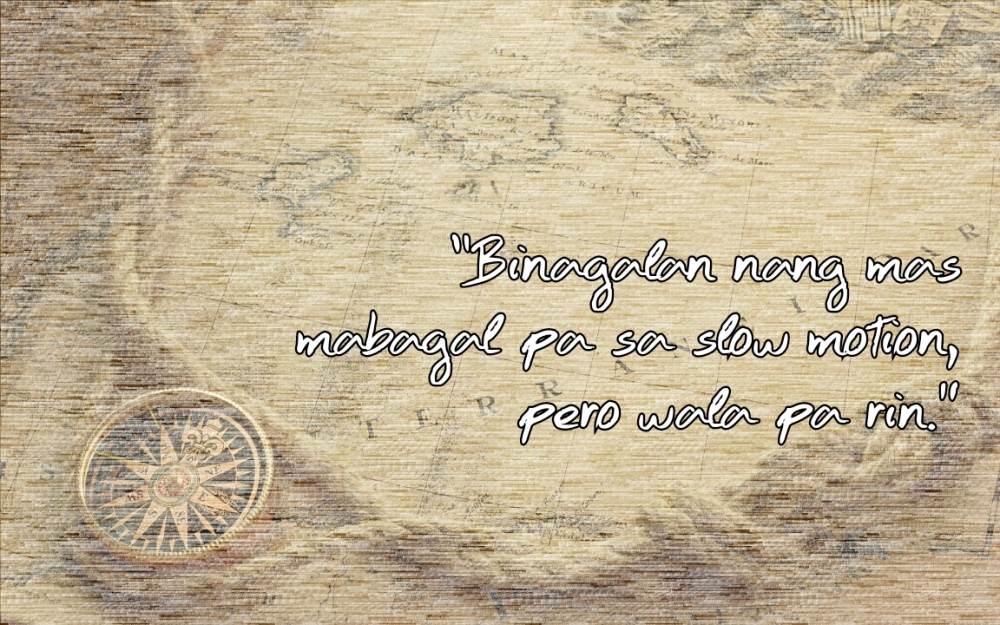
Can love survive even if it’s one-way? Pinag-aaralan ba ang pag-ibig? The third story was my favorite out of the five (even if Jordan and Irene was the couple I rooted for). It was a fantasy: Erica, a girl from a fictional alterverse called Maldiaga (where people don’t know how to love, much less what love is) was transported to our country, a place where everything is involved with love. She had the lucky strike to have been found by Mrs. Baylon for she took her in. Mrs. Baylon has a son, Jake, whose hobby in life is to woo girls into bed using a fake sob story he tells them about his father.
Erica was keen on learning what love is due to a curiosity she got after watching a certain video of a certain old woman who keeps talking about it. This old woman was said to have died pointing to emptiness as she says the words Mahal kita. Erica was set up by Mrs. Baylon with Jake. At first, his aim is to have a one night stand with her (just like what he always does with other girls) but he found himself falling in love with everything Erica does on their first date. It was only by the end of the date that he realized he feels something deep and different about her: Alam na ni Jake ngayon kung bakit siya nabubuhay. Para ibigin ang babaeng ito.
It was entertaining at best because all Erica wanted to do was to make this guy fall for her, and learn what love is. The video tells her that there only 3 K’s to know that was she’s feeling is love: Kabog, Kilig, at Kirot. Yet, she has no idea why she doesn’t feel all those three for Jake. Every I love you from Jake is answered by a line she got from movies. Everything he does, she makes sure she responds with what she thinks is right and necessary to make him happy. Erica must be thinking that like math or baking, love can be understood because it has methods. It does not.
And so it goes back to the question if love can survive even if it’s one way? Jake did everything he can to make Erica feel his love. Erica, for her part, tried to give back as much for him, but she just can’t feel those 3 Ks. He was sure he loves her, she was not even sure what she feels for him. Until one day, she just couldn’t take making Jake hopeful anymore because she feels that she’s never going to be able to give him half as much as he’s giving her. Erica decided to break up with him, and leave Mrs. Baylon’s house altogether.
I’d argue that Erica is in love with Jake even at that time when she’s fumbling and lost wondering what the heck this love is. It was a great reminder that love is beyond comprehension–not a vast amount of definition can actually surmise what it is until you’re in the moment and experiencing it. Erica was just so hung up in the idea that it was all pragmatic. She keeps telling herself matututo rin akong umibig, as if her brains can totally decipher it for her. It was sad because the moment she felt those 3 Ks, the moment that she realized she loves Jake, he was far gone after an accident while looking for her.
Kilig and kabog were easy welcome things in the life of those who have ever fallen in love, but it was kirot that actually determined the depth of those feelings. In Jake and Erica’s story, it only after years that she realized it because of that very hurt of seeing your loved one suffering. She stayed not because she pitied him, but because she now understood what it’s like to love someone, what it’s like to live for a person. It was sad because the story had to end with her hopeful that he’ll get better one day. And maybe life is just ironic and cruel: it answered Erica’s long-time aim to know what love was, but it is slowly taking away that person that was the reason she knew what love is.
ESTER, ang pang-apat na kwento

Is there really a marginal difference between a great love and a correct love? I am quite intrigued because somehow there’s an implied sadness every time the characters in the fourth story said that they’ve chosen a correct love–as if they settled, and it does not feel like love.
This section tells the story of Ester and her aged love affair Sarah. It was a lesbian relationship. Sarah was Ester’s helper at home, and they had a romance way back when Ester’s kids were still younger. It was a love that started at the top of their roof’s house. Ester was under a belief that the face that you see on a mirror while looking at the moon will be the person that you will truly love for the rest of your life. Sarah was that person for Ester until she chose to marry her now deceased-husband because it was the right thing to do. Over the years, they got estranged and Sarah ended up marrying Pio.
Years after, they would be reconnected. Ester has a gay son, AJ, who she often convinces to be a guy again. One night, he prodded her to reconnect with Sarah again because he knew they had a relationship before. Ester was adamant in telling him off, but AJ reasoned that his father has long been dead and it’s time for Ester to finally chase her own happiness and be free. After much convincing, they visited Sarah, and every Friday they would meet contented with what company they can offer for each other. Sarah made an excuse to Pio by saying that she’s working for Ester, but little did she know that he knows about their ongoing relationship. Thus, Pio vowed to strengthen his body. He wants to live for as long as he can because he can never let Sarah and Ester be happy. For as long as he is alive, the two of them can never go out freely. Paunahan na lang.
Ester, in one of their conversations, wistfully told AJ: “Never go out of bounds. There are certain boundaries para sa bawat tao at doon lang ang lugar mo. Kapag lumagpas ka, makakapanakit ka na ng iba.” It was a right sentiment because it’s a reminder as much as love challenges us to broaden our horizons, there are still limits because we to consider the people around us. There’s a factor that stops us from doing certain things. In a way, it seems that our happiness isn’t exactly the happiness that we want because we restricted ourselves.
So it makes me wonder a little if choosing a correct love is less appealing than going for your great love (considering that you have them as two options and you can only choose one). There seems to be an implication that a great love is one that you fought blood and life for. Great love was the love that moved you to do things you think you’d never do before. It was ecstatic and full of elation. Meanwhile, correct love seems to be about settling and going for something stable and acceptable (at least that’s what the story suggests).
For all our lives we’ve been told that love should be something that lifts us to greater heights, and yet love does not seem to be love if it cuts us back a bit. Is it any less a love if it’s not your great love, I wonder?
BESSIE, ang ikalimang kwento
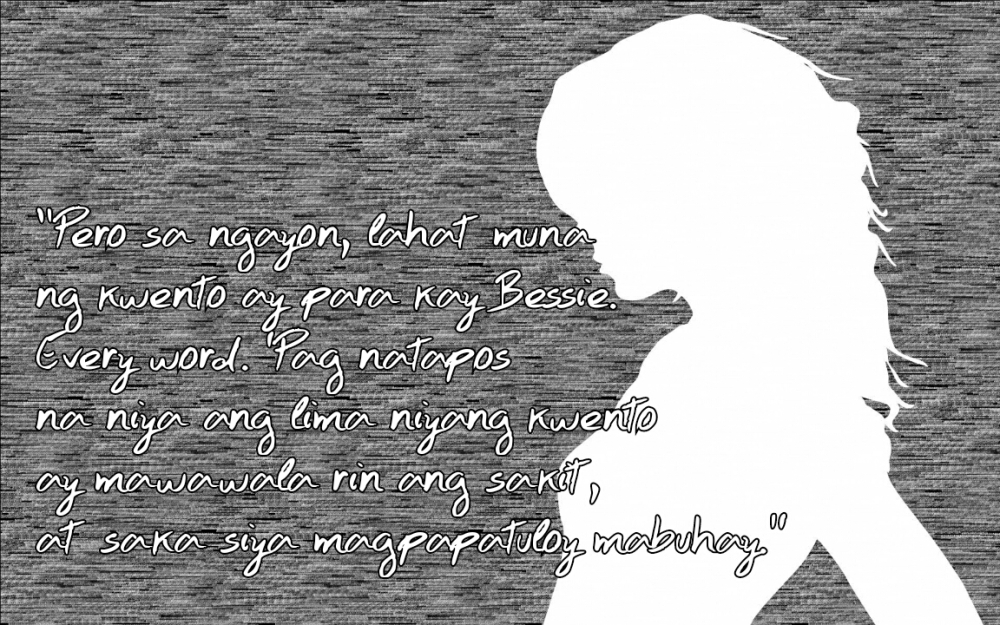
Does love come first that we see past the flaws? Or do we see the flaws first, set on to understand and fix them, and then call it love eventually? This was the question that the fifth story left me thinking about. It was the story of Lucas, the Writer of the first 4 stories. He was a non-attractive messenger who met Bessie (a self-destructive girl who changes boyfriends as fast as she changes clothes) and instantly fell in love with her. After a few moments of eye-flirting, Bessie invited Lucas over to her condo, planning to sleep with him because that’s what she often does. But then Lucas didn’t want to sleep with her because he believes that he’d only give up his virginity for a girl that he loves and truly loves him back. Instead, they bonded over Bessie role playing various characters from books, and he ended up being her companion–a personal assistant to her every escapade.
Lucas remained by her side, loving her still, even if there’s a slim chance that she’d love him back the same way. Every time she brings home a guy was an agony he bore, but he turned to the stories he’s writing instead hoping that one day Bessie will have a complete turn once she reads them. All those stories, he wrote for Bessie. They were stories of forbidden love, or romances that were almost on the edge because Bessie liked these kinds of stories. Lucas made sure that he each story has a character whose name starts with the letter b–all these roles were to be played by Bessie one day.
It was both amusing and achingly honest-to-life reading all those passages, the way he talks about Bessie, because there’s just a good chance that his love is never to be reciprocated. His heart is getting wasted by the minute, but I loved that even if he is the biggest idiot ever for staying by her side, I can’t really blame her. Everyone’s been made fool because of love, I guess. Some are lucky to find the one in their first time, but some just have it bad. I like that Lucas never blamed anything or anyone for that love because it was solely his choice to love her even if she’s promiscuous and just plain difficult to trust your heart with.
After a night of what Lucas thought was the beginning of real relationship between them, Bessie still went on her usual ways. And hurt beyond repair did Lucas end up after he got violently beat up by Bessie’s drug-induced ‘boyfriend’ Brigs (the son of a mayor). His heart was broken beyond repair, and it was at that point that he finally left her and the ring that she gave him before. It was kind of a sad ending in that he had to leave her not just maimed in the heart, but also scarred physically. I keep thinking that there was hope somewhere that their story could have ended in a different way, one that just went through a proper confrontation, but maybe Bessie’s lifestyle is an evident foreshadowing that it won’t end well.
Of course, I couldn’t completely blame Bessie because she was always point-blank in telling Lucas not to fall for her. She only sees him as a good friend and would like him to write stories that can help her propel to stardom. But where fault arise is when she slept with him, all of it to be some sort of an achievement the next day so that she can brag about to her friend AJ. It made me think even more about this ‘responsibility’ in an unrequited love where even if you don’t love that person back, you still have it in you to not lead him on especially, and especially then, when you know just how much he feels for you. It was honestly quite a deliberate play of Lucas’ feelings, and by the end of the story, Bessie was finally trying to do something about herself.
No matter what happened with these two however, the greatest takeaway from the story is that you have to love yourself first before you can be capable of giving love and worthy of receiving it despite of. Lucas was unsure of his place in the world, only going through life with an aim of writing stories for the one person he loves, but never quite figuring out what he wants to do for the bigger picture. Bessie, for unsure reasons, was destructive–she probably thinks she’s undeserving of any kind of love and went on from one guy to another, no strings attached. It will really take a while for them to actually be together unless they fix this one thing about themselves that has been eating their potential at bright chances.
I wished them luck.
IKA-ANIM, pwede pang i-revise ang kwento
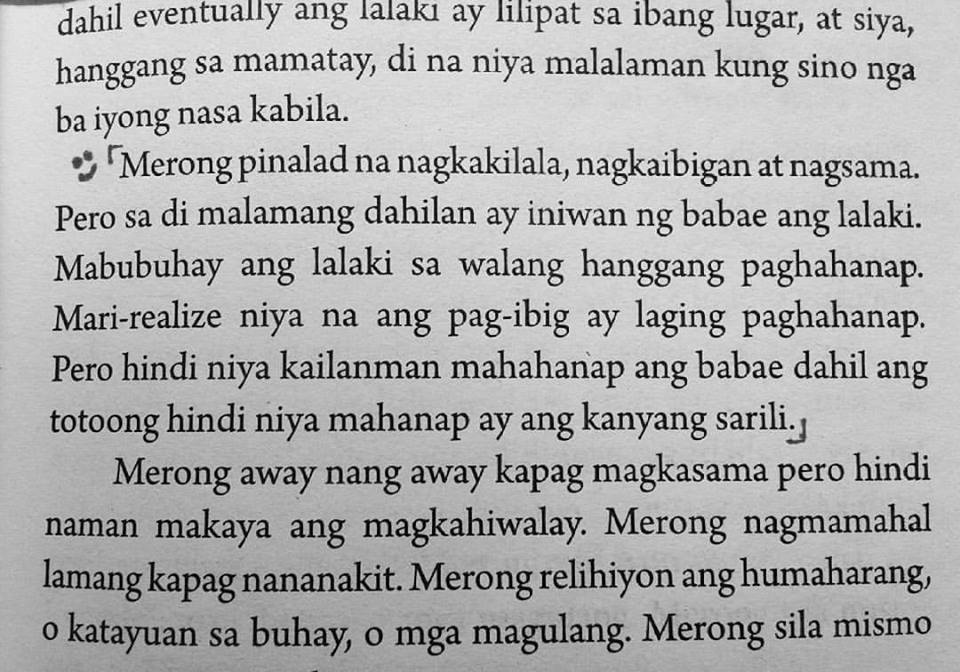
The end of fifth story was of Bessie and Jordan at the bridge of San Ildefonso, each looking for Lucas and Irene respectively. The Writer once again reminded us that only 1 out of 5 ends up being happy in love, and that only one from Bessie or Jordan can find that happiness. This sixth part of the story was an exploration of the life of Lucas, the real one, and the way he ended his story. Much time has passed but his heart was still aching after everything that happened in the story (Who wouldn’t?). Somehow, he finds the way he ended those five stories problematic, but he can’t quite point out how. In a night of imagination, he ‘met’ all of his characters, most especially the five girls who were the main stars of his stories. They had a definite answer to his dilemma: he was too heartbroken about Bessie that it ended up translating into his story, stripping him of looking at fiction in a bigger picture. And so he realized that he should have done things differently, and this time around, he wanted to give justice to the characters that he crafted.
The stories of Sandra, Erica, and Ester already had their respective endings. They were contented with what went on in their lives, and theirs were to continue going–who knows what’s in store for them? The only standing problem now are the unfinished stories of Irene and Bessie. Wala nang quota ang pag-ibig, Lucas rewrote, because the end of each story lies on the choice of the persons.
The most pressing at the moment was the story of Irene and Jordan. Jordan went back to San Ildefonso after swearing that he’d never because of the painful memories he chose to forget over the years. He left his job for a politician and is set on to change his ways because he wants to chase Irene. He intends to keep his promise to her. That’s what he did exactly. Where Irene used to be the one following him like a shadow, he was now the one following her wherever she went to prove her that he loves her. Irene was rightly hesitant to open up her heart to him once again. He did forget her after all and left her with all the memories to remember. But then she really couldn’t, Gusto niyang isiping wala na siyang nararamdaman para dito, na nakalimutan na niya ito, pero mas matinding makaalala ang puso kaysa utak.
It was great with this two because it didn’t take long for Jordan to pursue the love that he wants. When they met, and after she left him, it was like an instant wake-up call and I just definitely love that he didn’t waste time and set on to win her heart again. Irene made him remember the 20 words that he had her memorize when they were young, and he spent days trying to dig everything even if his mind just couldn’t. A few days passed and he just can’t come up with the 20 words, so he went and told her “Sorry, hindi ko maalala lahat ng 20 words. Pero mahal kita.” I guess that was enough an ordeal because Irene finally opened her heart. They deserved that second chance because their love was honestly just impeded by the circumstances that they went through in life.
The pureness of that promise under the San Ildefonso bridge when he gave her that watch was the foundation that made this love survive. It was agonizing at the most part because Irene did spend her formative years wondering if Jordan will ever come back to her. Maybe, just maybe, love is indeed a collection of memories and it is in the person’s choosing whether he or she will let them torment their lives or spur them to do great things. Jordan and Irene were meant to be together, and their story left me with such sweet taste and a happy picture in my mind that their love will stand the test of time.
ANG TOTOONG KWENTO sa totoong kwento
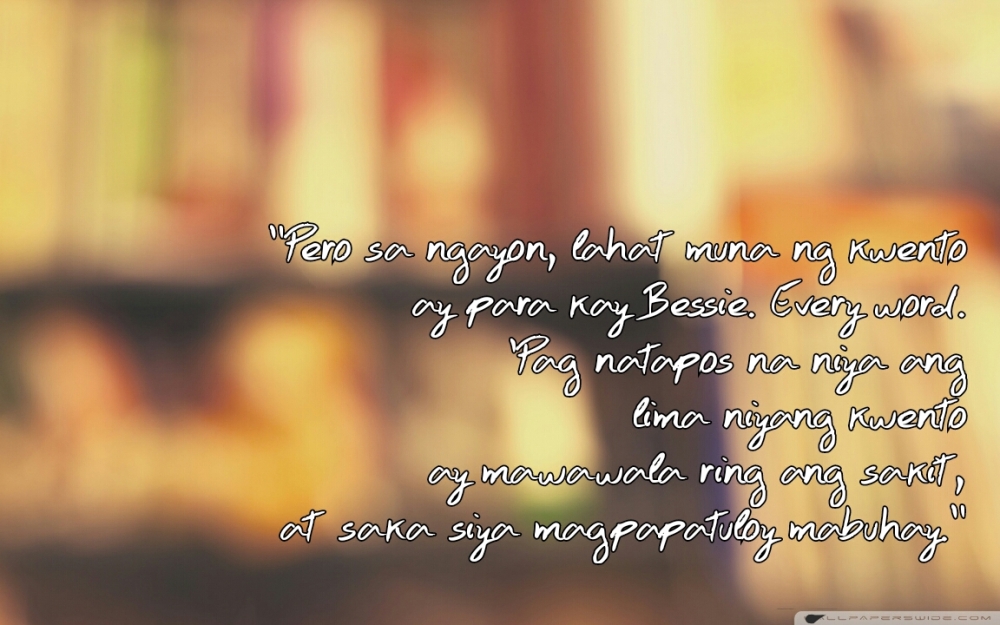
I made it a point to discuss what happened to Lucas in the sixth part of the story in this section in order to compare it better with what really went on in his life in the aftermath of the Bessie debacle. In the story, Lucas left the choice to Bessie. In the same time as Jordan, Bessie was also looking for Lucas. She stripped herself of her destructive ways and joined a number of advocacy that fight for national problems. Bessie volunteers for missions, hoping to find Lucas by chance wherever she goes. Sometimes, she feels that he’s just somewhere and they’d eventually find each other. But Lucas did not want to show himself. He wanted to make sure that his stories were finished. They were for Bessie after all.
Lucas believes that he can only move on from Bessie after he finishes writing those stories. And in the revised version, he did finish those stories and went to Bessie’s pad. He left the folder of papers outside her door, and she read it savoring every word. Their story ended that way. Lucas left the choice to Bessie.
But then, there’s a point in life where fiction and reality stops colliding, and what sucks is that all those sweet hopes you’ve had as you live in fiction turns out to be a venom out to bite you the second reality slaps you in the face. Because Bessie was nowhere near the Bessie that turned out in the book. In real life, she married Brigs and is a willing trophy wife prancing around to help his and his Dad’s election bid. Lucas went to find her and gave her story, still having this hope inside of him that she’s a better person now and they will have their second chance. She wasn’t, and they didn’t.
It was at that moment that Lucas realized that he’d put too much hope in her. He believed, in the way that he wrote the stories, that she will be a better person once they met again, but it was like a double sting when she did not turn out that way and did not even give him so much of the time of the day. Did he continue loving her in spite of everything he went through or did he love her more because he was hung up on his idea of her that she will change? The Bessie that Lucas dreamed of meeting again was that Bessie he wrote in his story–the one that came through and changed. It resonated in the way he ended Jordan and Irene’s story because he believed in a second chance. It resonated in the way that he wrote her because he believed that she loved her that much.
But maybe life wants him to move on from that supposed great love he felt for Bessie. He was, after all, in a search for himself. He didn’t know where he’s headed to the point that he’s even jealous of a train because at least it knows the direction it intends to take. Lucas found her again, but they were not to be because he was in search for himself. And so he grew old never to write love stories again, but was every once in a while thinking of her.
“…nilanghap ang hangin sa kanyang kapaligiran, at saka ngumiti, handa na uling lumaban sa kanyang mga araw at gabi kung saan paminsan-minsan, paminsan-minsan lang naman, napapaluhod siya’t nanghihina sa tapat ng kanyang kama, sa dilim ng silid ay nakayukong iginugupo ng iisang letra.”
Ricky Lee offered different kinds of love in this novel, each varying in the degree of feelings and emotions but they were love all the same. If we are to accept then that love is an unfathomable and ever-growing ball of uncertainty, then maybe we should accept that no one plays it smart in this game. It is a constant leap of faith, a never-ending search, and a defiance of all odds to take chances. It maybe is a cliché to say this, but it always rings true: love is just not for the faint of heart. It is not for those who will only accept it unless they’re sure that they won’t get hurt. Because only a fool would think that he or she will never get hurt.